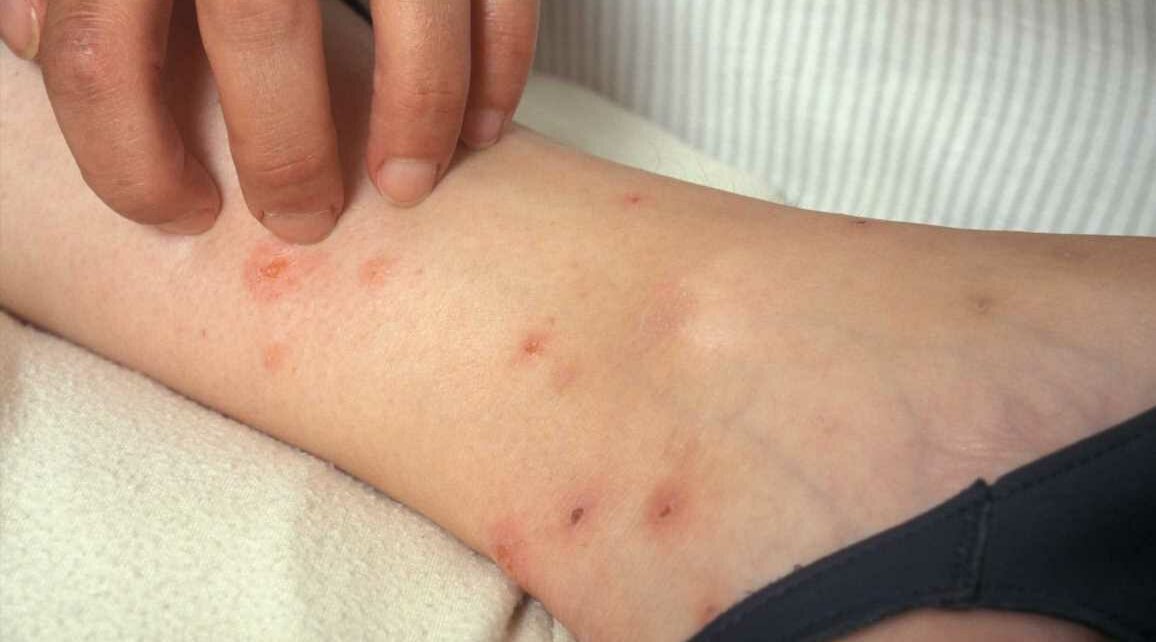FLEAS can cause agonising, itchy bites — but not everyone knows how to spot them.
The critters can be more common in the colder months as they move inside homes to seek shelter in the warmth.


Human fleas tend to prefer damp and dirty conditions and can be found in beds, particularly when unwashed blankets are used without a sheet.
They can also breed in cracks in dirty floors or use animals like dogs or cats to get in.
While cat and dog fleas will bite humans, they do not stay on people in the same way as human fleas.
They can be found in carpets, soft furnishings, animal bedding, behind panelling and in air ducts.
Read more on insect bites
 bugging out
bugging out
Bed bugs treatments: 8 products that kill the pests
 TICKED OFF
TICKED OFF
Brit holidaymakers heading to Spain urged to cover skin from blood-sucking ticks
Nic Shacklock, of Online-bedrooms.co.uk, said: “As we get further into the autumn season we want to warn people not to be surprised if their homes are invaded by packs of fleas.
“They don’t just latch onto pets, they can also give us nasty bites that’ll have us itching uncontrollably.
“Some early warning signs that indicate your home is infested by fleas include excessive scratching from pets and small, red splashes appearing on bedding.
“If you find fleas in your home, we advise using baking soda as well as a solvent of lemons, white vinegar and water on areas where they’ve been present.”
Most read in Health
 FIRST MISTAKE
FIRST MISTAKE
Ex-paramedic warns common nose bleed mistake could prove dangerous
 ‘I KNEW I WAS DYING’
‘I KNEW I WAS DYING’
Playboy model’s pee turned to acid & ate at her skin from vodka habit
 VIRAL SIGNS
VIRAL SIGNS
The 2 unique face changes that could be red flag signs of Pirola Covid variant
 HOLS TRAGEDY
HOLS TRAGEDY
Tragic Brit girl, 2, dies on holiday after docs ‘missed her burst appendix’
The NHS recommends you treat flea bites by applying calamine lotion to the affected area.
If bites are particularly severe, you can take an antihistamine to help reduce swelling.
You should also aim to kill the fleas in their living or breeding sights.
This can be done by using a long lasting insecticide in the house, along the skirting boards, floor cracks, wall cracks and under furniture.
Carpets and soft furnishings should also be treated with the same insecticide.
You can contact your local Environmental Health Department on which insecticide to use.
Clothing and bedding should be bagged while you wear an apron and gloves, and sent for a hot wash if possible.
They should be dried on as hot a cycle as you can get.
You should also go to the vet if you have an animal that is infected to get them treated.
Eight signs you have a flea infestation
- Red itchy bumps
If you notice red, itchy bumps on your body it’s likely fleas have either been biting you throughout the day or have been lurking in the covers at night.
Or if you have a pet at home, they may have latched onto your skin.
- Excessive scratching from pets
The most common warning sign of fleas is pets scratching themselves.
Make sure to regularly check their fur and take off their collar to get a proper look.
- Dark speckles on the carpet
Fleas like to attach to carpet fibres and can bury themselves deep in the material.
If you have a lightly coloured carpet and notice dark speckles dotted around, you could have an infestation on your hands.
- Flea eggs
Look out for tiny white flea eggs which may be dotted around the house.
If you find flea larvae in carpets it may be a sign of newly hatched eggs.
- Pets avoiding their beds
If your dog or cat starts to avoid sleeping in their bed or looks physically uncomfortable, it might be due to fleas attaching to the material.
- Red splashes on bedding
Fleas can be difficult to spot at times, but if you notice unusual red splashes of blood on your bedding it may be that one of the insects has been squished.
This could indicate that your bed is harbouring the tiny critters.
- Jumping fleas
While small in size, fleas that jump can be easier to spot.
If you see black spots leaping in the air, it’s likely to be fleas rather than tiny flies floating around the house.
- Bald patches on your pets
Read More on The Sun
 Money matters
Money matters
I budgeted £100 each for my kids' Xmas gifts – trolls say they 'have nothing'
 KEEPING WARM
KEEPING WARM
Full list of cold weather payments to help you through the winter
If you notice missing fur and bald patches appearing on your pets’ skin, it may be an indicator that fleas have latched onto them.
The excessive scratching can be a cause of this so make sure to put a comb through their fur to detect any signs of the critters.


Source: Read Full Article

